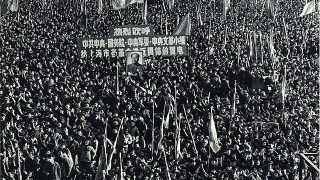A top official in Taiwan’s ruling Democratic Progressive Party (DPP) has warned the island’s 23 million residents to think carefully before traveling to Hong Kong or China in the wake of Hong Kong’s draconian national security law, which targets acts or speech seen as subversive by China anywhere in the world, as the U.S. upgrades its military commitment to the island’s defense.
DPP deputy leader Lin Fei-fan, himself a former leader of the 2014 student-led Sunflower movement that occupied Taiwan’s parliament in protest at a trade deal with China, said the law doesn’t just make life riskier for Hongkongers.
“I hope Taiwanese people traveling to Hong Kong will be mindful of their safety, because this is a law that affects not only Hong Kongers, but people in Taiwan and in countries around the world,” Lin told a party meeting.
The national security law, which took effect in Hong Kong on June 30, criminalizes speech and actions deemed subversive or secessionist, as well as actions, speech and help for people “colluding with foreign countries” or planning and committing acts of “terror.”
Its definitions are broad and are already being used to target people carrying protest banners, as well as actions that may be disruptive or destructive in nature, but which might be regarded as offenses against property or public order in other non-authoritarian jurisdictions.
There are provisions to ensure that the “wrong” opinions are no longer heard in the city’s education system, nor in its once freewheeling media.
The law applies to anyone in the world, and to acts and speech that take place anywhere in the world, if they are deemed injurious to China or Hong Kong’s status as part of China.
Critics of China at ‘high risk’
There are fears it could be used to prosecute anyone who has spoken in support of Taiwan independence, which is a mainstream political opinion on the democratic island, which has never been ruled by the Chinese Communist Party, nor formed part of the 70-year-old People’s Republic of China.
Lin’s warning echoed earlier comments by Taiwan’s Mainland Affairs Council (MAC) spokesman Chiu Chui-cheng on Wednesday: “If our people have been critical of the Chinese Communist Party, or have shown support for the anti-extradition movement [in Hong Kong], then they are at high risk.”
“We recommend that people avoid travel to Hong Kong, Macau or mainland China unless absolutely necessary,” Chiu said.
As thousands of people took to the streets of Hong Kong in defiance of a protest ban on Wednesday, Taiwan said its Taiwan-Hong Kong Services and Exchanges Office was now open for business to help Hongkongers fleeing the city to study, work, invest or take up residence in Taiwan.
Taiwan president Tsai Ing-wen said she expected the law to “fundamentally affect” the rule of law and human rights in Hong Kong, and said her party would continue to assist Hongkongers.
Taiwan announced on Friday it would set up a representative office in the U.S. territory Guam, to reflect a closer alliance with the U.S. in the face of growing Chinese aggression in and around its territory.
The island’s ministry of foreign affairs said it had taken the decision to reflect the growing partnership between Taiwan and the U.S. and the strategic importance of the Pacific region to Taiwan. It had earlier been shut down due to budget cuts.
“Re-establishing TECO in Guam will facilitate economic and trade cooperation and exchanges between Taiwan and the greater Western Pacific region, deepen Taiwan’s relations with its Pacific allies, and increase multilateral exchanges,” the ministry said in a press release.
Taiwan Defense Act
The announcement came after U.S. Representative Mike Gallagher introduced the House version of the Taiwan Defense Act (TDA) on Wednesday, to ensure the U.S. continues to meet its obligations under the Taiwan Relations Act (TRA) in the face of the Chinese Communist Party’s aggressive military build-up, according to an official news release.
The TRA was passed in 1979 after the U.S. cut ties with the 1911 Republic of China on Taiwan to build ties with China, which insists that its diplomatic partners not recognize Taipei.
The law commits Washington to providing sufficient defense weapons and services to Taiwan to enable it to defend itself.
“[On June 30], we saw the Chinese Communist Party (CCP) end one country, two systems. No longer can anyone harbor the illusion that the CCP would unify peacefully with Taiwan,” Gallagher said in a statement, in a reference to the national security law for Hong Kong.
“Taiwan’s liberty is a vital national security interest of the United States, and the Taiwan Defense Act helps ensure our military has the capabilities it needs to block CCP aggression,” Gallagher said.
The bill is an attempt to prevent Beijing from annexing Taiwan before the U.S. can mount a military response. Chinese President Xi Jinping has refused to rule out such a course of action, and says “unification” with Taiwan is an inevitability.
Gallagher’s introduction of the bill came as China launched a five-day naval exercise near the contested Paracel Islands in the South China Sea to test its ability to seize islands.
Chinese military aircraft and ships have also passed close to Taiwan’s airspace and waters on numerous occasions since Tsai took office in 2016.
Reported by Chung Kuang-cheng for RFA’s Cantonese Service, and by Hwang Chun-mei for the Mandarin Service. Translated and edited by Luisetta Mudie.
Source: Copyright © 1998-2016, RFA. Used with the permission of Radio Free Asia, 2025 M St. NW, Suite 300, Washington DC 20036. https://www.rfa.org.



